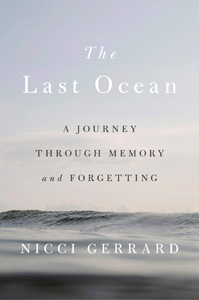 Nicci Gerrard, The Last Ocean; A Journey Through Memory and Forgetting (New York: Penguin, 2019), 255pp.
Nicci Gerrard, The Last Ocean; A Journey Through Memory and Forgetting (New York: Penguin, 2019), 255pp.
After Nicci Gerrard's father was diagnosed with dementia, he lived for ten years with the disease before he died. That slow motion experience in which the self is "dismantled" led to this poignant memoir about what dementia does to both patients and their caregivers. At a simple level this is Gerrard's family story about her father John, and how after he died she founded "John's Campaign" in order to change the culture of hospitals and how they treat dementia patients and their families (whereas most people want to die at home, only a small percentage get that wish).
But Gerrard's memoir is more than a personal story; it's a philosophic reflection on "the indelible essence of the self" as interpreted through the experience of dementia. She explores the meaning of human identity, the mind-body relationship, memory, music, art, language, love, personal agency, and relationships. She tells the stories of how numerous families have negotiated the experiences of dementia — denial, anger, frustration, helplessness, guilt, shame, and fear. Gerrard has also read broadly on the subject, and so does a deep dive into the scientific literature. She has interviewed numerous experts. Her book is also a social-ethical critic of how our health systems care for dementia patients and their families. The longest and perhaps the best chapter in her book is the one on how dementia impacts the caregivers.
Gerrard writes with a palpable sense of empathy, an appreciation for the many ambiguities of a disease that presents itself with a wide range of variations, and with a respect for the dignity of people who experience dementia. Her book is an emotional roadmap to a dreaded disease that is becoming increasingly common in our society. Gerrard challenges us to consider "what we owe each other, what we care about, what matters in this world we all share. Who matters."
Dan Clendenin: dan@journeywithjesus.net


